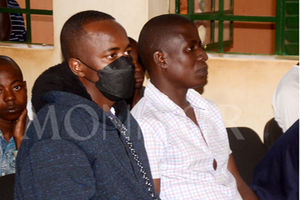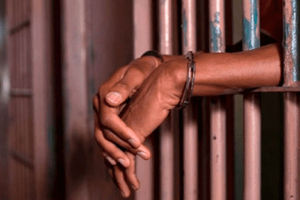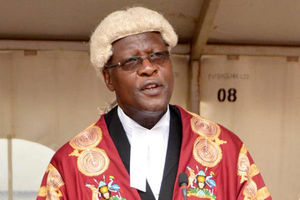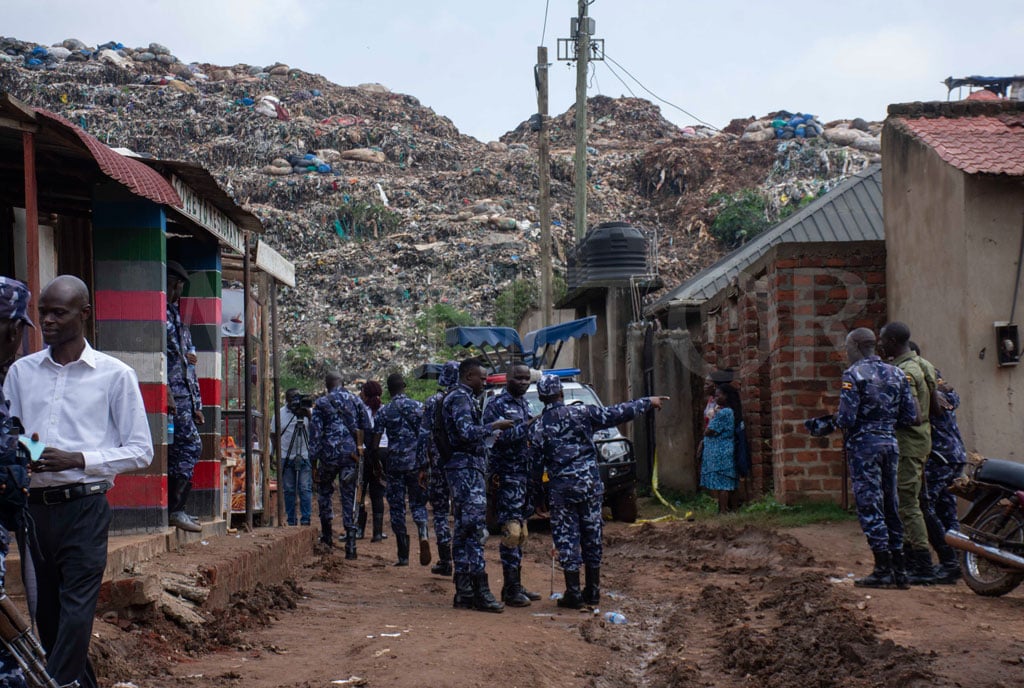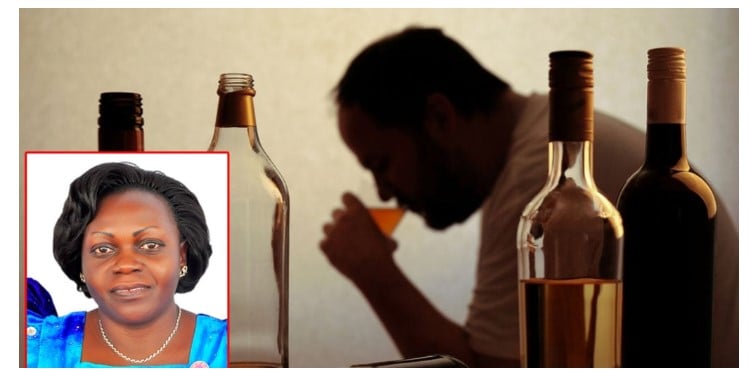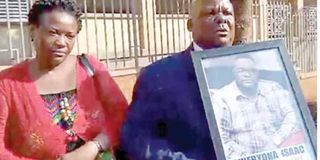
As the clock ticked towards 4pm on February 20, 2024, in a packed high courtroom in Kampala, bespectacled 42-year-old Richard Muhumuza, in a long-sleeved beige checked shirt and khaki slacks, was sentenced by Justice Alex Mackay Ajiji to 44 years in prison, for the murder of his 23-year-old brother Isaac Ainebyoona.
The offence carries a maximum sentence of death. However, Justice Ajiji opined: “The sentencing guidelines provide in the schedule to between 35 years to death. This case is unique and it is with the family; a brother killing a brother.”
He ordered that the period of two years, two months and nine days Muhumuza spent on remand be deducted so as to serve 42 years.
The verdict shocked Muhumuza and his wife, Annet Kobusingye, but not his father, John Kasimoni, who was a witness for the prosecution. The 71-year-old greeted the verdict by taunting his eldest son, sparking a war of words inside and outside the courtroom, with his in-laws who are still convinced of Muhumuza’s innocence. Outside the courtroom, Mr Kasimoni, who clutched a portrait of his deceased son, addressed the media with his wife Rose Kyomuhendo, in tow.
“I raised Richard as one of my children and he also entrusted me with raising his children. So, I was shocked that he would kill my 23-year-old son after I had looked after him and his children. Isaac was my firstborn. I am happy with the decision of the court and I feel like justice has been done,” Mr Kasimoni told reporters.
He, further, hinted on a property wrangle, which was not clearly laid out during hearing of the case, as the probable motive.
“Richard grew jealous of Isaac’s property and wealth and decided to kill him,” Mr Kasimoni claimed.
While the deceased’s parents were relieved that justice had been served, there was also the irony that the accused is also their [step] son. Muhumuza, on the other hand, whom Daily Monitor spoke to from Luzira prison to fill in on several unanswered questions and contradictions, maintains his innocence.
His young brother, according to court documents, died of multiple organ failure occasioned by acute pancreatitis, diabetes mellitus, and Covid-19, on May 15, 2021, at Nsambya hospital. No post-mortem was conducted immediately, but he was buried three days later.
Court documents show that Mr Kasimoni, a businessman, not satisfied with the stated cause of death, requested the hospital for a blood sample to be taken to the Uganda Viral Research Institute. The results came back negative for Covid-19. This prompted him to lodge a complaint at Kabalagala Police Station in June 2021 upon which a court order was secured for the exhumation of the body for tests which was conducted on July 30, 2021, and submitted to the Government Analytical Laboratory on August 2 for toxicological analysis.
“The tests revealed that the stomach contents contained carbofuran, which is an agricultural pesticide which the toxicologist describes as a dangerous, poisonous substance capable of killing,” court documents detail.
April 12, 2022, toxicological analysis report from the Government Analytical Laboratory detailed that body samples “qualitatively contained Carbofuran”.
The pesticide poisoning
Carbofuran, according to ScienceDirect, an online scientific journal, is a pesticide that is widely used to control insects and nematodes on a variety of agricultural crops because of its wide-ranging biological activity.
“The extensive use of pesticides for agricultural and nonagricultural purposes has been directly responsible for environmental contamination and human health issues. Symptoms of carbofuran poisoning include nausea, vomiting, abdominal cramps, sweating, diarrhea, excessive salivation, and weakness,” the journal details.
While Muhumuza was convicted solely on circumstantial evidence, the court seemingly ignored an October 24, 2022, addendum to the first report signed by the police forensic pathologist, Dr Moses Byaruhanga, that concluded: “For now, we hold reservation to conclude the cause of death as due to Carbofuran poisoning.”
The addendum report recommended a “quantitative test to be performed to determine the actual chemical concentration level in the submitted samples and whether it was a lethal dose and the sample further submitted for analysis in a different laboratory for another opinion.”
According to Dr Byaruhanga’s report, “the possible sources are contaminated food and crops when they are intentionally or accidentally ingested or when they get exposed to the skin. Carbofuran poisoning causes acute death primarily by respiratory failure or hypoxemia.”
Monitor revisited the case to answer several unanswered questions, talked to key witnesses and experts in the case. However, Mr Kasimoni declined multiple requests for an interview. What we found was a tale of the unraveling of the chord of three strands that bound Kasimoni and his two sons, one in prison for killing his sibling
The disunity in a family that was once unified under its patriarch, Kasimoni, a successful businessman from Bushojye Village, Kajwamusana in Rukungiri, was first glimpsed after Ainebyoona passed away from a short illness on May 15, 2021.
The deceased was admitted to hospital on May 8 complaining of worsening abdominal pain per his medical report, which noted that he was morbidly overweight and had a family history of diabetes and hypertension. His blood sugar was measured at 27.1 millimoles per litre and a subsequent test an hour after his admission found his blood sugar at 21.9 millimoles per litre, at least four times the normal 5.6 mmol/L threshold.
As such, the deceased was diagnosed with diabetes mellitus and acute pancreatitis, as the pancreas wasn’t producing enough insulin; a leading cause of hyperglycemia or high blood sugar levels, he would not recover despite the medical care he received.
Ainebyoona was buried on May 18, 2021, and it was during his burial that the turmoil within the family was untangled. Addressing mourners in Kicwamba Parish, Ruhinda Sub-county, a grieving and visibly upset Kasimoni, who spoke last, revealed rather astonishingly that Muhumuza was responsible for his brother’s death.
Muhumuza’s wife, Annet Kobusingye, recalling how close the brothers were to their father still expresses disbelief at his father-in-law’s eulogy.
“On the day they admitted Isaac, Mzee Kasimoni called me and also called Richard, very early in the morning. So, Richard went there. He [Kasimoni] said you come, they are admitting Ainebyoona and we want you to participate. Richard participated from admission up to clearing the body. He paid medical bills. He paid for the food they ate in the hospital. He organised the burial. If you really think someone has poisoned your son, how does that person pay for food at the canteen of the hospital and you are eating it?” Ms Kobusingye recalled.
Muhumuza’s brother-in-law, Jack Mwebaze, who exchanged bitterly with Kasimoni in the courtroom following the guilty verdict, said the latter’s revelations raised more questions than answers.

L-R: Isaac Ainebyoona, John Kasimoni and Richard Muhumuza at a past family gathering
The contradictions
Mr Mwebaze, Kobusingye’s brother, who could be seen exchanging words in the courtroom with Mr Kasimoni following the verdict, recalls being similarly shocked at the latter’s revelation which he reckons raises more questions than answers.
“It is Richard who delivered the sibling’s speech at Kitara Church, where the Kampala church service took place. It is Richard who delivered the speech for the siblings. Now, if he already had question marks, would you really let him get involved that far?” Mr Mwebaze wondered.
Inexplicably, one family member narrated that during the funeral, Kasimoni was initially opposed to a post-mortem.
“When he publicly accused Richard of fratricide, the police arrived to take the body for a post-mortem examination but he refused saying his son was dead and that was the end of the matter. Only for him to subsequently exhume the body,” a family member said.
The exhumation report disclosed that samples of the stomach contents, specifically four milliliters of bile, a piece of scalp tissue with hair, two big toenails, and parts of the liver and kidney were samples taken for toxicology tests.
The toxicology report from the Government Analytical Laboratory was submitted as evidence in court and it would go a long way in proving Aineyoona’s death was caused by an unlawful act, which is one of the key ingredients of the offence of murder.
In his judgment, Justice Ajiji stated: “The existence of this toxic substance in the body of the deceased coupled with the symptoms exhibited by the deceased before he died as narrated by the father’s prosecution proved that the deceased died by poisoning.”
Throughout the judgment, Dr Byaruhanga’s addendum, to the post-mortem report, which raises more questions is not alluded to hence it remains unclear whether it was submitted at all despite the legal precedent in the case of Kooky Shamar and Anor versus Uganda 2002, in which the Supreme Court stated: “If the request for analysis indicated suspicion that the person had been poisoned we would expect [ …] the Senior Government Chemist to have put in his report the quantity in ratio or figures found in the organs and the consequences of those quantities.”
In Justice Ajiji’s opinion, the absence of quantitative analysis of the poison Crabofuran found in the body of the deceased, did not cast doubt on the prosecution’s assertion that the deceased had died from Carbofuran poisoning. This view seems impervious to doubt even in the face of discrepancies between the symptoms of Carbofuran poisoning such as excessive tearing, salivation, and paralysis, and those exhibited by Ainebyoona when he was admitted at Nsambya Hospital.
A pathologist at the College of Health Sciences at Mulago, speaking anonymously, explained that the symptoms of Carbofuran poisoning are hard to miss by trained medical professionals, deeming it improbable that the deceased would report to hospital with organophosphate poisoning and no health worker would notice and respond with critical care.
The fact that the deceased was not treated for poisoning suggests he was suffering from other ailments and that it had not occurred to him or his parents that he may have been poisoned. Muhumuza’s wife, Ms Kobusingye reiterated the same.
“And the very parents who admitted, who took the son for admission, did not tell the doctors to check for any poison,” she noted.
The pathologist told Monitor that Carbofuran is a fast-acting poison whose acute effects manifest within minutes and or within 24 hours which casts further doubt on the prosecution’s assertion that Ainebyoona died after having been poisoned two months prior.
In the view of the pathologist, if the deceased had ingested Carbofuran, he would not have been able to drive home that night let alone make subsequent long-distance road trips.
However, during cross-examination, the defendant himself, according to the judgment, seemed to have contradicted himself on the events of the night when the Carbofuran was apparently administered.
Cocktails at the bar
Per the judgment, Mr Kasimoni testified that on March 14, 2021, while enjoying the company of his wife and two sons at Auto Spa Munyonyo, Muhumuza bought a drink from a serving area, 26 metres away from where their parents were sitting, for Ainebyoona and stirred it before serving the deceased who fell sick four days later.
This account was corroborated by the deceased’s mother, Kyomuhendo. On their testimony, the judge concluded that Muhumuza “was properly identified at Auto Spa stirring the drink that was consumed by the deceased. For defence counsel Denis Akanyijuka this begs the question.
“So, we really wonder if he saw something that was suspicious. Why didn’t he intervene at that moment and ask the deceased not to partake of the drink or why didn’t he actually grab the drink and pour it down as the father of both kids?” Kobusingye wondered.
Speaking from Luzira prison, Muhumuza, however, claimed their father had actually tasted the deceased’s drink and found that it was too sweet for his taste buds.
“And the accused has a different version of the events. He says that, actually, Mzee [took] the drink and told him, “Why do you take sweet things?” the defendant’s lawyer, Denis Akanyijuka said.
So, the version that Mzee was suspicious, and he asked the accused to taste the drink, and the accused refused is not true. We will really dispute that,” Mr Akanyijuka noted, further noting that the accused’s father’s eye sight is impaired at night.
“Mr Kasimoni, testified that he had had eye surgery. That’s the reason why he called Isaac to drive him during the night, that he could not see properly. He testified that from the sauna, he ordered four drinks, and he had already taken some drinks by then at that point.
So, we really wonder, someone who had taken some beers, who had, I’m not certain of the number, but he said two to three beers. So, somebody who had taken those bottles of beers, and who had the eyesight problem, testified that it was between eight to 9pm. We are surprised how he came up to see somebody who was 26 metres away from him at that time in such a situation. And we maintain that. It’s not true.”
Given the burden of proof is on the prosecution in such a case, it is curious that they were unable to prove key details and but relied extensively on the deceased’s father’s account that the accused spiked his brother’s cocktail with poison.
The venue had CCTV cameras but no footage of that night was furnished to fortify the prosecution’s case. Per his police statement, the bar manager, Mr Pascal Ssendegya, claimed that June 3, 2021 Kasimoni accompanied by a police officer came to Auto Spa Bar and Restaurant and requested for CCTV footage. The footage was not admitted as evidence.
“The evidence adduced by the prosecution is that the deceased was poisoned as demonstrated in the previous ingredient. Any person who poisons another clearly knows that the act will cause harm or probably cause the death of the victim,” Justice Ajiji averred, noting that malice aforethought is a mental element that is difficult to prove by direct evidence and as such courts usually consider circumstantial evidence. This view is given credence by Kasimoni’s testimony: “Muhumuza had grudges against his brother regarding land located at Bushojye where the accused had even encroached on part of his brother’s land and he wanted to own all of it.”
Per the judgment, this was corroborated by the testimony of prosecution witness Geoffrey Lubare, who visited the site and “on interaction with neighbours, he noticed and LC1 had confirmed” that Muhumuza had encroached on about 69 feet on the deceased’s land and built two poles made of concrete.
Monitor visited the said area and spoke to neighbours and LC1 chairperson Walter Sunday, who said the squabble had been resolved internally without the aid of the local authorities.
“Mzee Kasimoni told me those squabbles between the two brothers had been resolved by the family. And on the face of it, the bickering appeared to cease because you can still find the slab on which the gate once stood before Richard moved it,” Mr Sunday said.
However, according to the judgment, Mr Kasimoni testified that the accused fled the burial, and later sent a message in the form of a proverb on the family WhatsApp group that “a forest is shrinking but the trees kept voting for the axe for the axe was clever and convinced the trees but because his handle was made of wood, he was one of them.”
As the Kasimoni family reels from the death of one of the sons and the sentencing of another for his murder, the nature of investigations and the contradictory accounts raises more questions than answers.
